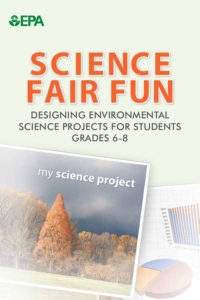 Why are science fairs important? What makes the science fair process valuable? It’s an excellent question and a good way to start a class discussion about this time-honored tradition. First and foremost, why DO we ask our students to work on a science fair project year after year? The answer, in a nutshell, is to help them learn how to think like scientists. Scientists find answers to questions that interest them. In other words, your students simply need to ask themselves, What do I want to know more about?
Why are science fairs important? What makes the science fair process valuable? It’s an excellent question and a good way to start a class discussion about this time-honored tradition. First and foremost, why DO we ask our students to work on a science fair project year after year? The answer, in a nutshell, is to help them learn how to think like scientists. Scientists find answers to questions that interest them. In other words, your students simply need to ask themselves, What do I want to know more about?
Where to Start
The key to a successful project is for the student to choose a topic that is meaningful to him or her. It shouldn’t be a flat, academic exploration—it should connect to the student’s own life interests. Perhaps the topic might be related to cooking, sports, or even advertising. For instance, have you ever see a commercial and wonder if the claims are really true? Does one brand of diapers really hold more liquid than another? Do all brands of bubble gum make the same size bubbles? How permanent are permanent ink markers? Does the absence of a basketball net affect free throw accuracy?
In a nutshell: thinking like a scientist means being curious about something.
We’ve created a one-stop resource for teachers and parents whose kids have asked the age-old question: What should I do for my science fair project? We’ve opted to share some uncommon ideas in the hopes that they’ll spark even greater curiosity in your students. Spend some time reviewing the links on this page. You’re sure to find some amazing new ideas. If you’d like to share other science fair links, please let us know in the Comments section below!
Agriculture
- In what ways do different types of fertilizers affect plant growth?
- How does soil pH affect the pH of water that touches the soil?
- Does soil type change how well crops grow?
- What happens to the way plants grow if there are no microorganisms in the soil?
Chemistry
Are you looking for a chemistry or interdisciplinary science fair project idea? Here’s an enormous list of chemistry science fair project ideas.
Acids, Bases & pH – These are chemistry projects relating to acidity and alkalinity, mostly aimed at the middle school and high school levels.
Caffeine – Is coffee or tea your thing? These projects relate mostly to experiments with caffeinated beverages, including energy drinks.
Crystals – Crystals can be considered geology, physical science, or chemistry. Topics range in level from grade school to college.
General Chemistry – This is a broad collection of different types of science fair projects relating to chemistry.
Green Chemistry – Green chemistry seeks to minimize the environmental impact of chemistry. It’s a good topic for middle and high school students.
Plant & Soil Chemistry – Plant and soil science projects often require a bit more time than other projects, but all students have access to the materials.
Energy
Science Projects in Energy – Energy science activity ideas.
Renewable Energy Science Projects – Science ideas in renewable energy and energy conservation.
Fire, Candles & Combustion – Explore combustion science. Because fire is involved, these projects are best for middle school and higher grade levels.
Environmental Science
Earthquakes – Science Fair Project Ideas – Science Fair Projects from the US Geological Survey on earthquake predicting, impacts, seismology, and more.
Environmental Science Projects – Science fair projects about reducing, reusing, and recycling waste materials.
Pollution – Explore sources of pollution and different ways to prevent or control it.
 Environmental science projects cover ecology, assessing environmental health, and finding ways to solve problems. This link offers many ideas. In addition, you can also download a 24-page How-To Guide from the Environmental Protection Agency (EPA) here.
Environmental science projects cover ecology, assessing environmental health, and finding ways to solve problems. This link offers many ideas. In addition, you can also download a 24-page How-To Guide from the Environmental Protection Agency (EPA) here.
- Can you use gray water (water that has been used for bathing or washing) to water your plants? Does it matter what type of soap you used for your cleaning? Are some plants more tolerant of gray water than others?
- How does the presence of soap or detergent in water affect seed germination and plant growth?
- What effect does the presence of phosphates have, if any, on the oxygen level of water in a pond?
- Does the pH of rain or other precipitation (snow) vary according to season?
- Is the pH of rain the same as the pH of soil?
- What organisms can you use as indicator organisms to alert you to a dangerous environmental condition in the environment?
- How does an oil spill affect marine life?
- Are carbon filters as effective with chlorinated or fluoridated water as they are with water that does not contain chlorine or fluoride?
Food Science
Believe it or not, food—and cooking—involves a great deal of science! Plus, it’s a topic that many students can appreciate even if they’re not interested in the usual scientific fields. If cooking isn’t their idea of fun, there’s also the related area of Household Project Testing. Researching products and understanding how people select them is an interesting science fair topic for students who might not ordinarily enjoy science.
Use these questions to help trigger more food-related science fair ideas.
- Does eating hot or spicy food change your body temperature?
- Can chewing mint gum or using mouthwash really chill your mouth?
- Will chilling an onion before cutting it keep you from crying?
- If you shake up different kinds or brands of soft drinks (e.g., carbonated), will they all spew the same amount?
- Do all breakfast cereals that say they have 100% of the US RDA for iron really have the same amount? (here’s the test)
- Are all potato chips equally greasy? Is the greasiness different if different oils are used (e.g., peanut versus soybean)?
- Does eating breakfast have an effect on school performance?
- Salt & Sugar – Salt and sugar are two ingredients anyone should be able to find. Which of them increases the conductivity of tap water best? What happens if you change the concentration of the solution?
- Do the same types of mold grow on all types of bread?
- Does light effect the rate at which foods spoil?
- Will foods containing preservatives stay fresh longer than foods without them?
- How does time or season of harvest affect the chemistry and nutritional content of food?
- Does exposure to light affect the amount of vitamin C in juice?
- Can you use a household water filter to remove flavor or color from other liquids?
- Does the power of a microwave affect how well it makes popcorn?
- Can you tell/taste the difference between ground beef, chuck, and round after they have been cooked?
Materials Science
Materials science involves physical science and engineering. Science fair projects can invent new materials, improve existing materials, test the properties of materials, or compare the suitability of different materials for a specific purpose. Here’s a look at some science fair project ideas in this field of research.
- Which material is best at resisting corrosion?
- Compare the strengths of various types of paper towels.
- Which type of fabric survives repeated machine washing the best?
- Compare the effectiveness of different types of sunscreen products.
- Which chemicals produce the most corrosion on a particular material?
- What processes can increase the strength of metals?
- Which type of wood burns the most slowly? Which produces the most heat when burned?
- Is one type of glue the strongest?
- Magnets and Magnetism – Explore magnetism and compare different types of magnets with these project ideas.
- Plastics & Polymers – Plastics and polymers aren’t as complicated and confusing as you might think. These projects may be considered a branch of chemistry or material science.
Sports Science
Sports science projects may be attractive to students who don’t see how science is practical in everyday life. These projects may be of particular interest to athletes.
General Tips
If anyone is an expert on science fairs, it’s Dr. Maille Lyons, also known as the “Science Fair Coach.” Her website is friendly, informative, and brimming with helpful tips on some of the finer points of science fair presentations. You can also check out her blog, “All about Science Fair Judging.”
Science Fair Project Guide – Process of planning, developing, implementing and competing in science fair activities.
Science Fair Project Guide Book – This 36-page PDF for teachers, students and parents shows you how to get started and plan a great science fair project.
 The Society for Science & the Public (SSP) has a “Fair Finder” web page where you can find an SSP-affiliated science fair in your state or region. These competitions exist all over the United States as well as in over 70 other countries. Many of these science fairs are affiliated with the Intel International Science and Engineering Fair (Intel ISEF) and/or the Broadcom MASTERS. To compete at Intel ISEF, a 9th-12th grade student must first win the honor through participation at an SSP-affiliated fair.
The Society for Science & the Public (SSP) has a “Fair Finder” web page where you can find an SSP-affiliated science fair in your state or region. These competitions exist all over the United States as well as in over 70 other countries. Many of these science fairs are affiliated with the Intel International Science and Engineering Fair (Intel ISEF) and/or the Broadcom MASTERS. To compete at Intel ISEF, a 9th-12th grade student must first win the honor through participation at an SSP-affiliated fair.
